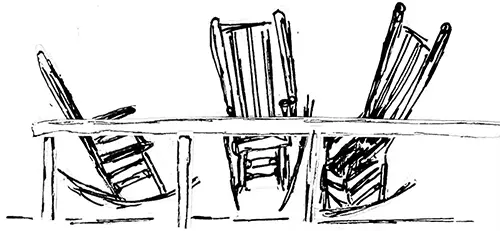The Stump 340
Take to the Land: A Strategy for Third Parties
Even if ‘land’ is less important than actual vote share, this map does point to a very real issue at the heart of American politics: namely that majorities, specifically local…
Bridging the Gap Between Narrative and Reality: Guido Preparata
Modest and hopeful, but backed up by a lot of thought and research, Guido Preparata's work is at least a beginning. Surrounded by lies, it’s high-time we started telling another…
The Roots of America’s Falling Fertility
Human fertility is not the root of our problems. It is but one symptom of a deeper, more elemental problem.
The Front Porch and the American Dream
Perhaps, just perhaps, COVID has restored some of the beauty and desirability of the front porch.
Limits, Risk Aversion, and Technocracy
What about Lasch’s analysis of limits? I have in mind two contemporary cultural developments, the rise of technocracy and our extreme aversion to risk, that seem to challenge certain aspects…
Playing the Long Game: A Review of Abraham Lincoln’s Statesmanship
The Lincoln that Schaff puts forth cultivated liberal democracy by placing limits and crafting public consensus. In order to see Lincoln in a new light, Schaff applies Aristotle’s ideas of…
A Conservative for Our Time
In a letter he wrote to his grandchildren, Udall challenged them to "Support all endeavors that promise a better life for the inhabitants of our planet. Cherish sunsets, wild creations…
A Time for Local Democracy
In these days of Twitter democracy, when platforms for political expression are so accessible, it sometimes seems, paradoxically, that citizens have little actual say in decision making about our country’s…
Another Night Like All The Rest
Men are fallen creatures who think they’re perfectible when in fact they’re hardly improvable.
The Worst?
2020 has certainly had real trials and tribulations, but our approach to it is also reflective of a culture in which everything disliked has long been “the worst.”
Some Possibly Helpful Thoughts on Localism, Populism, and Proximity During a Pandemic
[Cross-posted to In Medias Res] The departure of Donald Trump from the White House [crosses fingers] will assuredly not mean the departure of Trumpism from American life. The collection of…
The Promise and Forgiveness of Hillbilly Elegy
Hillbilly Elegy is indeed political, but in a deeper sense, entangled as it is in the webs of broken promises and repeated forgiveness.
Max Picard’s Silence
Perhaps, without silence for a reference point—something out there that reminds us of our place in the big order of things—the masters of information feel free to shade, obscure, or…
Jacques Barzun’s 1937 Critique of Race-Thinking
On the heels of a consequential election, and the accompanying commentary demonstrating the continued pervasiveness of race-thinking, Barzun’s message of honoring each human individual’s value while recognizing our shared common…
It’s a Federalist’s World, After All
Amidst the ongoing chaos and conflict over the 2020 presidential election, and vote tabulating methodologies in particular, let’s remember—and celebrate—that so far it is really only federalism that has won…
A Country Boy Can Thrive
You can leave your corner of the country without escaping it. And these memoirs testify to the importance of bringing something back.
The Power of Proximity
In television and movies, heroes often push away the ones they love, because relationships can be obstacles or endangering for one or both parties. But what if love is not…
The Long Road to National Healing
The rancor of this political season provides a diversion from the hard and serious work that must be done to reverse the great unraveling that America is experiencing.
An Appeal to Millennials: Don’t Waste your Vote on the Lesser of Two Evils
Supporting a third party is one way of advocating for long-term, structural change.
Embattled: The Story of the O’Hanlon Fresco
Mill Valley, CA. As our country struggles to come to terms with its racist past—and present—a controversy surrounding a 1934 mural at the University of Kentucky mirrors the racial tensions…
Adapt or Die: Kunstler’s Guide to Living in the Long Emergency
James Howard Kunstler follows the first commandment handed down to all of us at birth: “Thou shalt not be dull.”
From the Village Square to the Global Village—and Back?
At their best, local papers “help provide a common reality and touchstone, a sense of community and of place.”
The Death of a Justice and the Hope of Magnanimous Statesmanship
We do not need reminding of how bitter, partisan, and polarized American politics is today. In order to have a community, people need to hold some things in common. America…
“Following the Science” in a Polarized Age
We should “follow the science.” But we need to have the intellectual humility—and moral fortitude—to acknowledge the provisional, incremental nature of scientific understanding.















